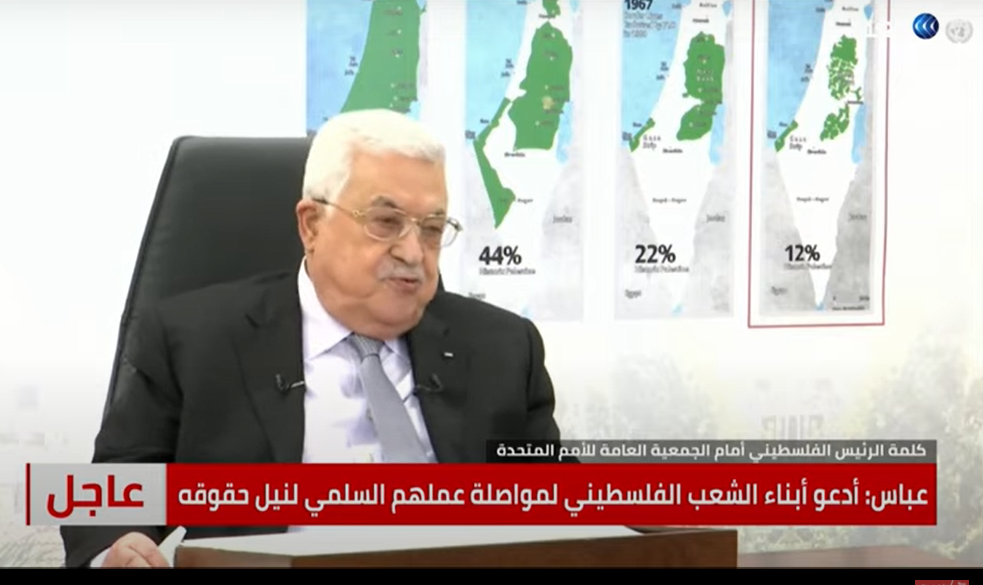During a closed hearing of the Knesset’s Foreign Affairs and Security Committee, Prime Minister Benjamin Netanyahu stated that Israel is preparing for the post-Mahmoud Abbas era.
He emphasized the importance of preventing the collapse of the PA, expressing that it is necessary for their interests that the authority continues to function and operate effectively.
Regarding the Palestinian aspirations for an independent state, Netanyahu unequivocally stated, “Their ambition for an independent state should be extinguished.”
Netanyahu’s remarks follow the weakening of the PA in Judea and Samaria, Mahmoud Abbas’s advanced age (87), and increased preparations within the Fatah movement for his departure from the political stage.
The Biden administration is exerting significant pressure on Israel to prevent the collapse of the PA, aiming to avoid security chaos in Judea and Samaria and the strengthening of extremist elements such as Hamas.
Additionally, they seek to preserve the two-state option, which they consider the logical and only solution given the current conditions on the ground.
Ronen Bar, the head of the Shin Bet, visited the US recently and discussed with senior officials in the Biden administration, as well as United Nations officials, ways to strengthen the PA in light of the increasing power of armed terrorist groups in Judea and Samaria.
Assistant Secretary of State for Middle East Affairs, Barbara Leaf, also visited Israel, the PA, and Jordan. She engaged with senior political and military leaders in Israel, Chairman Mahmoud Abbas of the PA, and King Abdullah of Jordan.
They discussed the security situation in Judea and Samaria and the necessity to bolster the Palestinian Authority from both security and economic perspectives.
The administration is concerned about the weakening rule of the Palestinian Authority in Judea and Samaria, the high level of terrorism on the ground, the Israeli government’s settlement policy, and the attacks on Palestinian residents by extremist elements against the backdrop of a severe wave of terrorism.
According to a senior PA official, Barbara Leaf conveyed to Mahmoud Abbas that the administration cannot change Israeli policy opposing the establishment of an independent Palestinian state in Judea and Samaria.
The Israeli government has recently directed relevant professional bodies to explore the possibility of operating the “Marin” natural gas field off the coast of Gaza. This move aims to channel the financial revenues to the PA, significantly improving their financial situation.
Israel is willing to grant extensive autonomy to the Palestinians in Judea and Samaria on economic matters but opposes the establishment of an independent Palestinian state.
Israel cites the transformation of the Gaza Strip into a terrorist entity following the IDF’s full withdrawal in 2007, which resulted in thousands of rocket attacks against Israel.
Whenever Israel withdraws from an area, it quickly becomes a Palestinian terror base for attacks.
Therefore, Israel believes it is imperative to maintain full security control in Judea and Samaria.
Presently, Hamas and Islamic Jihad are attempting to establish terrorist infrastructure for rocket production in northern Samaria, with the intention of attacking Israel.
Nabil Abu Rudineh, the spokesperson for the PA chairman, responded to Prime Minister Netanyahu’s statement by affirming that “establishing an independent Palestinian state, with East Jerusalem as its capital, is the only solution to achieving security and stability.”
Abu Rudineh emphasized that the Palestinian state exists and is recognized by 140 countries, and it requires an end to the occupation to achieve independence.
Senior political officials in Jerusalem argue that the increasing Palestinian terrorism in Judea and Samaria reinforces the notion that the Palestinians’ only viable political horizon is broad autonomy while Israel maintains security control.
The Palestinian Authority’s security forces do not effectively combat terrorism in Judea and Samaria due to a political decision by Mahmoud Abbas, who limits security coordination with Israel to a partial extent.
The PA knowingly violates the Oslo Accords and cannot be fully trusted in the fight against terrorism. Therefore, Israel’s security forces must shoulder the responsibility of preventing terrorist attacks.
The PA strongly opposes the “economic peace” policy proposed by Israel in coordination with the US. However, from Israel’s perspective, the Palestinian demand for an independent state is irrelevant.
The Oslo Accords have collapsed, Mahmoud Abbas’s reign is nearing its end, and the succession battle within Fatah is in full swing.
Political negotiations with the PA are not currently on the agenda, and the international community is also awaiting Mahmoud Abbas’s departure from the political stage.
Israel is preparing for the post-Mahmoud Abbas era, with the primary goal of ensuring security in Judea and Samaria.
This will enable Palestinians to hold general elections to choose a new PA chairman and parliament.
Mahmoud Abbas dissolved the parliament to establish his dictatorial rule, but his governance from 2005 until today has been corrupt and ineffective, failing to yield any political achievements for the Palestinians while worsening the economic and security situation in Judea and Samaria.
Israel must learn from the failures of Mahmoud Abbas’s government and the collapse of the Oslo
Accords.
Establishing an independent Palestinian state in Judea and Samaria poses a significant security threat to Israel.
It aligns with the phased strategy of the PLO, aimed at the destruction of the State of Israel.
Therefore, the current Israeli government’s policy toward the Palestinians in Judea and Samaria, which focuses on providing full autonomy for the Palestinian residents while maintaining IDF’s security responsibility, is just and appropriate.




